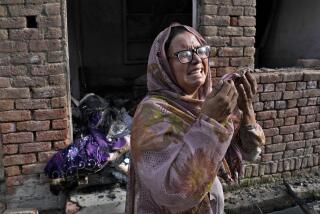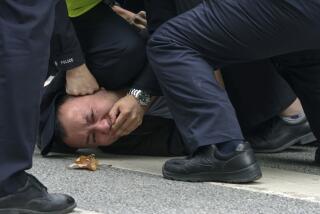Muslim Unrest in China Confirmed : Religion: Official news agency says 22 people received long prison terms this month in connection with deadly riot in May.
- Share via
BEIJING — In a rare confirmation of unrest among China’s Muslims, official sources said Sunday that 49 people were killed when paramilitary police units moved in to suppress fighting between rival religious groups outside a Ningxia province mosque last May.
The official New China News Agency said 22 people, including a prominent Ningxia province political leader and two Muslim academics, were sentenced to long prison terms this month after they were convicted on charges that included murder and “unlawfully buying guns and ammunition” in connection with the incident.
Chinese authorities claimed they confiscated 5,442 guns and 21 homemade cannons after what they described as “gang fighting” in the city of Xiji, 700 miles southwest of Beijing.
The Ningxia incident was the bloodiest in a series of Muslim disturbances that occurred in western China last year. Incidents involving China’s Muslims--who number between 20 million and 40 million, according to various estimates--are a sensitive issue with the Chinese Communist government, particularly in light of Muslim nationalist and fundamentalist movements in the former southern Soviet republics and other regions of Central Asia.
On Oct. 7, Chinese military forces stormed a mosque in Xining, capital of Qinghai province, and arrested Muslim leaders who the government claimed had “assaulted local party and government offices, smashed police vehicles and besieged and attacked people and security and armed policemen.”
Demonstrations by Muslims protesting the publication of a children’s book they claimed insulted the Islamic faith were also reported in Gansu, Xinjiang and Sichuan provinces.
Ningxia province is the center of China’s Hui Muslim minority population that converted to Islam when the region was an important destination for Arab traders in the 7th Century.
Several times in Chinese history, the Ningxia population has figured in extensive demonstrations against the country’s authorities.
Although the incident in May appeared to involve rival religious groups attempting to win control of a regional sect, Chinese authorities fear any episode that could ignite the scattered Muslim population and threaten to divide the country.
According to the New China News Agency, one of those arrested in Ningxia was a prominent local politician, Ma Liesun, who served on the national committee in Beijing representing China’s minority populations. He was sentenced to 15 years in prison and stripped of his political rights for four years after his conviction for “intentional murder” and various gun charges.
Ma Fuli, associate professor at the Ningxia Normal College, and Ma Rucheng, described as a farmer, were charged with the same crimes and sentenced to life imprisonment. Ma Jie, a lecturer at the Northwest No. 2 Nationalities Institute, received a sentence of 20 years, also on the same charges.
Beginning in May, 1992, the news agency reported, the four men “organized gang fighting and revenge despite warnings from the local government and Communist Party committee.”
Southern Ningxia province, where the incident took place, has long been a stronghold of Sufism, the mystical school of Islam that has often played a role in revolts against authority in China.
In widespread Muslim revolts between 1855 and 1873, a powerful Sufi leader named Ma Hualong held Qing Dynasty armies at bay for years.
According to sources, the fighting in May was the result of a succession battle in the Sufi Zheherenye sect following the death of the sect’s imam, Ma Tenghai, in June, 1991. The sect is reported to have 100,000 followers in Ningxia.
The contest to replace Ma Tenghai turned to violence, with rival parties battling outside the Xiji mosque when Chinese People’s Armed Police were called. Authorities did not say how many of the dead, if any, had been killed by police gunfire.
More to Read
Sign up for Essential California
The most important California stories and recommendations in your inbox every morning.
You may occasionally receive promotional content from the Los Angeles Times.













